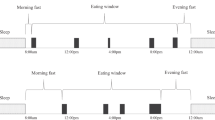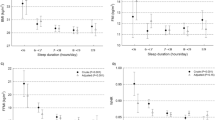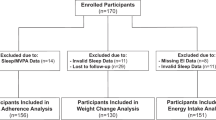Abstract
Background/objectives
Emerging adults (~18–28 years of age) have a high prevalence of poor sleeping habits and poor diet quality; however, little is known on whether these poor sleeping habits are associated with dietary outcomes in this age group. This study assessed associations between actigraphy-based sleep with energy intake (EI), overall diet quality, and measures of meal timing in emerging adults.
Subjects/methods
Data on 135 emerging adults (age = 19.4 ± 1.3 years; body mass index (BMI) = 26.5 ± 6.9 kg/m2; 58% female; 65% White) from the RIGHT Track Health project were used. Measures included actigraphy-assessed sleep duration, sleep efficiency, sleep timing midpoint, day-to-day sleep duration and sleep timing midpoint variability and combined sleep duration and sleep timing behaviors (early-bed/late-rise, early-bed/early-rise, late-bed/late-rise, late-bed/early-rise); EI (three 24-h dietary recalls), diet quality (Healthy Eating Index 2015 total score) and meal timing outcomes (timing of first and last meal intake, total duration, and midpoint of the eating window).
Results
Shorter sleep duration, later sleep timing midpoint and greater sleep efficiency, as well as combined late-bed/late-rise and late-bed/early-rise groups, were associated with lower diet quality. Greater sleep timing midpoint variability was associated with higher EI, and the late-bed/early-rise group had significantly delayed first meal timing.
Conclusion
In emerging adults, shorter sleep duration and later sleep timing are associated with lower overall diet quality, and greater sleep timing variability is associated with higher EI. Future research is needed to examine the role of sleep on diet quality and eating habits to identify potential targets for nutritional interventions in this age group.
This is a preview of subscription content, access via your institution
Access options
Subscribe to this journal
Receive 12 print issues and online access
$259.00 per year
only $21.58 per issue
Buy this article
- Purchase on Springer Link
- Instant access to full article PDF
Prices may be subject to local taxes which are calculated during checkout

Similar content being viewed by others
Data availability
Data described in the manuscript, code book, and analytic code can be made available upon request.
References
St-Onge MP, Grandner MA, Brown D, Conroy MB, Jean-Louis G, Coons M, et al. Sleep duration and quality: impact on lifestyle behaviors and cardiometabolic health: a scientific statement from the American Heart Association. Circulation. 2016;134:e367–86.
Chaput JP, Dutil C, Featherstone R, Ross R, Giangregorio L, Saunders TJ, et al. Sleep timing, sleep consistency, and health in adults: a systematic review. Appl Physiol Nutr Metab. 2020;45:S232–47.
Morales-Ghinaglia N, Fernandez-Mendoza J. Sleep variability and regularity as contributors to obesity and cardiometabolic health in adolescence. Obesity. 2023;31:597–614.
St-Onge MP. Sleep-obesity relation: underlying mechanisms and consequences for treatment. Obes Rev. 2017;18:34–9.
Dashti HS, Scheer FA, Jacques PF, Lamon-Fava S, Ordovás JM. Short sleep duration and dietary intake: epidemiologic evidence, mechanisms, and health implications. Adv Nutr. 2015;6:648–59.
Golley RK, Maher CA, Matricciani L, Olds TS. Sleep duration or bedtime? Exploring the association between sleep timing behaviour, diet and BMI in children and adolescents. Int J Obes. 2013;37:546–51.
Chan WS. Daily associations between objective sleep and consumption of highly palatable food in free-living conditions. Obes Sci Pract. 2018;4:379–86.
Grummon AH, Sokol RL, Lytle LA. Is late bedtime an overlooked sleep behaviour? Investigating associations between sleep timing, sleep duration and eating behaviours in adolescence and adulthood. Public Health Nutr. 2021;24:1671–7.
Thellman KE, Dmitrieva J, Miller A, Harsh JR, LeBourgeois MK. Sleep timing is associated with self-reported dietary patterns in 9- to 15-year-olds. Sleep Health. 2017;3:269–75.
Spaeth AM, Hawley NL, Raynor HA, Jelalian E, Greer A, Crouter SE, et al. Sleep, energy balance, and meal timing in school-aged children. Sleep Med. 2019;60:139–44.
Ogilvie RP, Lutsey PL, Widome R, Laska MN, Larson N, Neumark-Sztainer D. Sleep indices and eating behaviours in young adults: findings from Project EAT. Public Health Nutr. 2018;21:689–701.
Sato-Mito N, Shibata S, Sasaki S, Sato K. Dietary intake is associated with human chronotype as assessed by both morningness-eveningness score and preferred midpoint of sleep in young Japanese women. Int J Food Sci Nutr. 2011;62:525–32.
Baron KG, Reid KJ, Kern AS, Zee PC. Role of sleep timing in caloric intake and BMI. Obesity. 2011;19:1374–81.
Ansu Baidoo VY, Zee PC, Knutson KL. Racial and ethnic differences in eating duration and meal timing: findings from NHANES 2011–2018. Nutrients. 2022;14:2428.
Adafer R, Messaadi W, Meddahi M, Patey A, Haderbache A, Bayen S, et al. Food timing, circadian rhythm and chrononutrition: a systematic review of time-restricted eating’s effects on human health. Nutrients. 2020;12:3770.
Rangaraj VR, Siddula A, Burgess HJ, Pannain S, Knutson KL. Association between timing of energy intake and insulin sensitivity: a cross-sectional study. Nutrients. 2020;12:503.
Deshmukh-Taskar P, Nicklas TA, Radcliffe JD, O’Neil CE, Liu Y. The relationship of breakfast skipping and type of breakfast consumed with overweight/obesity, abdominal obesity, other cardiometabolic risk factors and the metabolic syndrome in young adults. The National Health and Nutrition Examination Survey (NHANES): 1999–2006. Public Health Nutr. 2013;16:2073–82.
Kant AK, Graubard BI. Association of self-reported sleep duration with eating behaviors of American adults: NHANES 2005–2010. Am J Clin Nutr. 2014;100:938–47.
Arnett JJ. Emerging adulthood. A theory of development from the late teens through the twenties. Am Psychol. 2000;55:469–80.
Nelson MC, Story M, Larson NI, Neumark-Sztainer D, Lytle LA. Emerging adulthood and college-aged youth: an overlooked age for weight-related behavior change. Obesity. 2008;16:2205–11.
Casper–Gallop. The state of sleep in America. Washington, D.C.: Gallop, Inc.; 2022.
Wideman L, Calkins SD, Janssen JA, Lovelady CA, Dollar JM, Keane SP, et al. Rationale, design and methods for the RIGHT Track Health Study: pathways from childhood self-regulation to cardiovascular risk in adolescence. BMC Public Health. 2016;16:459.
Dollar JM, Calkins SD, Berry NT, Perry NB, Keane SP, Shanahan L, et al. Developmental patterns of respiratory sinus arrhythmia from toddlerhood to adolescence. Dev Psychol. 2020;56:783–94.
McNeil J, Berry NT, Dollar JM, Shriver LH, Keane SP, Shanahan L, et al. Associations of actigraphy-assessed sleep variables with adiposity and serum cardiometabolic outcomes in emerging adults. J Sleep Res. 2023:e14068. https://doi.org/10.1111/jsr.14068. Online ahead of print.
Sadeh A, Sharkey KM, Carskadon MA. Activity-based sleep-wake identification: an empirical test of methodological issues. Sleep. 1994;17:201–7.
Reed DL, Sacco WP. Measuring sleep efficiency: what should the denominator be? J Clin Sleep Med. 2016;12:263–6.
Lemola S, Ledermann T, Friedman EM. Variability of sleep duration is related to subjective sleep quality and subjective well-being: an actigraphy study. PLoS ONE. 2013;8:e71292.
Krebs-Smith SM, Pannucci TE, Subar AF, Kirkpatrick SI, Lerman JL, Tooze JA, et al. Update of the Healthy Eating Index: HEI-2015. J Acad Nutr Diet. 2018;118:1591–602.
Thomas EA, Zaman A, Cornier MA, Catenacci VA, Tussey EJ, Grau L, et al. Later meal and sleep timing predicts higher percent body fat. Nutrients. 2020;13:73
Mikulovic J, Dieu O, Fardy PS, Bui-Xuan G, Vanhelst J. Influence of sleep timing behavior on weight status and activity patterns in adults with intellectual disabilities. Res Dev Disabil. 2014;35:3254–9.
Zerón-Rugerio MF, Longo-Silva G, Hernáez Á, Ortega-Regules AE, Cambras T, Izquierdo-Pulido M. The elapsed time between dinner and the midpoint of sleep is associated with adiposity in young women. Nutrients. 2020;12:410.
Troiano RP, Berrigan D, Dodd KW, Mâsse LC, Tilert T, McDowell M. Physical activity in the United States measured by accelerometer. Med Sci Sports Exerc. 2008;40:181–8.
Lipsky LM, Nansel TR, Haynie DL, Liu D, Li K, Pratt CA, et al. Diet quality of US adolescents during the transition to adulthood: changes and predictors. Am J Clin Nutr. 2017;105:1424–32.
Kracht CL, Chaput JP, Martin CK, Champagne CM, Katzmarzyk PT, Staiano AE. Associations of sleep with food cravings, diet, and obesity in adolescence. Nutrients. 2019;11:2899.
Stern JH, Grant AS, Thomson CA, Tinker L, Hale L, Brennan KM, et al. Short sleep duration is associated with decreased serum leptin, increased energy intake and decreased diet quality in postmenopausal women. Obesity. 2014;22:E55–61.
Cespedes EM, Hu FB, Redline S, Rosner B, Gillman MW, Rifas-Shiman SL, et al. Chronic insufficient sleep and diet quality: contributors to childhood obesity. Obesity. 2016;24:184–90.
Garcez MR, de Castro MA, César CLG, Goldbaum M, Fisberg RM. A chrononutrition perspective of diet quality and eating behaviors of Brazilian adolescents in associated with sleep duration. Chronobiol Int. 2021;38:387–99.
Gębski J, Jezewska-Zychowicz M, Guzek D, Świątkowska M, Stangierska D, Plichta M. The associations between dietary patterns and short sleep duration in Polish adults (lifestyle study). Int J Environ Res Public Health. 2018;15:2497.
Mondin TC, Stuart AL, Williams LJ, Jacka FN, Pasco JA, Ruusunen A. Diet quality, dietary patterns and short sleep duration: a cross-sectional population-based study. Eur J Nutr. 2019;58:641–51.
Jansen EC, Prather A, Leung CW. Associations between sleep duration and dietary quality: results from a nationally-representative survey of US adults. Appetite. 2020;153:104748.
Mossavar-Rahmani Y, Weng J, Wang R, Shaw PA, Jung M, Sotres-Alvarez D, et al. Actigraphic sleep measures and diet quality in the Hispanic Community Health Study/Study of Latinos Sueño ancillary study. J Sleep Res. 2017;26:739–46.
Haghighatdoost F, Karimi G, Esmaillzadeh A, Azadbakht L. Sleep deprivation is associated with lower diet quality indices and higher rate of general and central obesity among young female students in Iran. Nutrition. 2012;28:1146–50.
Chaput JP, Després JP, Bouchard C, Tremblay A. The association between short sleep duration and weight gain is dependent on disinhibited eating behavior in adults. Sleep.2011;34:1291–7.
Ramón-Arbués E, Granada-López JM, Martínez-Abadía B, Echániz-Serrano E, Antón-Solanas I, Jerue BA. The association between diet and sleep quality among Spanish university students. Nutrients. 2022;14:3291.
Zuraikat FM, Makarem N, Liao M, St-Onge MP, Aggarwal B. Measures of poor sleep quality are associated with higher energy intake and poor diet quality in a diverse sample of women from the go red for women strategically focused research network. J Am Heart Assoc. 2020;9:e014587.
Shechter A, O’Keeffe M, Roberts AL, Zammit GK, RoyChoudhury A, St-Onge MP. Alterations in sleep architecture in response to experimental sleep curtailment are associated with signs of positive energy balance. Am J Physiol Regul Integr Comp Physiol. 2012;303:R883–9.
McNeil J, Doucet É, Brunet JF, Hintze LJ, Chaumont I, Langlois É, et al. The effects of sleep restriction and altered sleep timing on energy intake and energy expenditure. Physiol Behav. 2016;164:157–63.
Elmenhorst EM, Elmenhorst D, Luks N, Maass H, Vejvoda M, Samel A. Partial sleep deprivation: impact on the architecture and quality of sleep. Sleep Med. 2008;9:840–50.
Rusu A, Ciobanu DM, Inceu G, Craciun AE, Fodor A, Roman G, et al. Variability in sleep timing and dietary intake: a scoping review of the literature. Nutrients. 2022;14:5248.
Acknowledgements
The authors thank the participants who generously gave their time to contribute to this study.
Funding
The RIGHT Track Health study was supported by funding from NIH-NICHD grant 1R01HD078346 to the University of North Carolina at Greensboro and NIH-NIDDK grant P30DK056350 to the UNC Nutrition Obesity Research Center. The content is solely the responsibility of the authors and does not necessarily represent the official views of the NIH.
Author information
Authors and Affiliations
Contributions
JMD, LHS, SPK, LS, and LW designed and conducted research. JM and NTB performed statistical analysis. JM wrote the paper. JM had primary responsibility for the final content. All authors reviewed and approved the final manuscript.
Corresponding author
Ethics declarations
Competing interests
The authors declare no competing interests.
Ethical approval
The Institutional Review Board at the University of North Carolina at Greensboro approved all study procedures (IRB #11-0360). Written informed consent was obtained from all participants.
Additional information
Publisher’s note Springer Nature remains neutral with regard to jurisdictional claims in published maps and institutional affiliations.
Rights and permissions
Springer Nature or its licensor (e.g. a society or other partner) holds exclusive rights to this article under a publishing agreement with the author(s) or other rightsholder(s); author self-archiving of the accepted manuscript version of this article is solely governed by the terms of such publishing agreement and applicable law.
About this article
Cite this article
McNeil, J., Berry, N.T., Dollar, J.M. et al. Cross-sectional associations of actigraphy-assessed sleep with dietary outcomes in emerging adults. Eur J Clin Nutr (2024). https://doi.org/10.1038/s41430-024-01417-9
Received:
Revised:
Accepted:
Published:
DOI: https://doi.org/10.1038/s41430-024-01417-9



